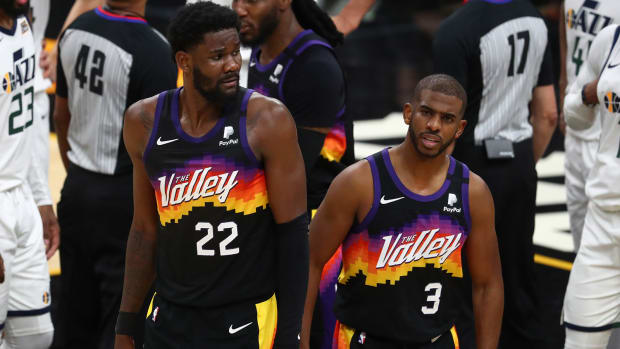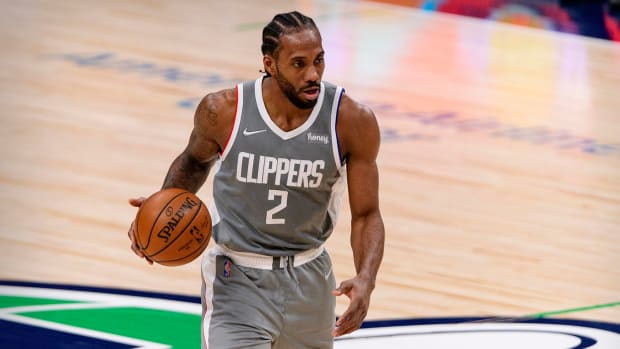The No. 1 pick has become a more effective player in his third year with a rising Phoenix team.
Welcome to the Morning Shootaround, where every weekday you’ll get a fresh, topical column from one of SI.com’s NBA writers: Howard Beck on Mondays, Chris Mannix on Tuesdays, Michael Pina on Wednesdays, Chris Herring on Thursdays and Rohan Nadkarni on Fridays.
Deandre Ayton’s career thus far has been an exercise in patience.
Phoenix’s center was selected with the No. 1 pick in the 2018 NBA draft, and he faced significant scrutiny from his first moments in the NBA out of Arizona. As Luka Dončić sprinted out to a dominant rookie season with the Mavericks, Ayton took the usual baby steps. His strong scoring totals belied his production. He relied too heavily on his admittedly smooth jumper, and, defensively, the young center was a relative disaster. Phoenix was quickly pilloried for its draft mistake, one that could have haunted the franchise for years to come.
Fast forward a couple of years, and Ayton looks like a completely different player. He may never catch Dončić as the jewel of the 2018 draft, but it’s certainly possible to see the two sharing All-Star appearances throughout the 2020s. Ayton is a more purposeful player on both ends in 2020–21. His physicality is making an impact on both ends of the floor, and the timidity present throughout his rookie year is now firmly in the rearview mirror. If it feels as though Ayton made a significant leap this season, well, that’s because he has.
“[Ayton] is really settling into his roll,” Suns head coach Monty Williams says. “He’s really focused on being a beast in the paint. ... He keeps staying locked in.”
Ayton’s scoring talent was on display throughout his rookie season. He averaged 16.3 points per game on 58.5 percent from the field–including a 72.2% mark in the restricted area–and he even outdueled Dončić with 18 points on 8-of-11 shooting in Phoenix’s season opener. Yet it too often felt as though Ayton was putting up empty calories, content to mosy from quarter to quarter as Phoenix finished an ugly 19–63.
The Suns were outscored by 8.1 points per 100 possessions with Ayton on the floor in his rookie season. 15.7 percent of his points came via midrange jumper. The young center seemed to slip every screen in sight, unwilling to lay a body on his opponent as Phoenix’s guards failed to find a modicum of wiggle room. You can pin some of Ayton’s struggles on Phoenix’s total lack of point guard play (a problem that has since been rectified), though regardless of circumstance, it was hard to leave Ayton’s rookie year encouraged.
The start of 2019–20 didn’t exactly provide a dose of optimism. Ayton was suspended 25 games to start the year after testing positive for a diuretic, placing him further behind the proverbial eight ball as Dončić and Trae Young continued to shine as top-five picks in the 2018 class. But Ayton’s offensive skill set was as present as ever when he returned in late December 2019, and he finished the season with a net rating of plus-four points per 100 possessions. The partnership between Ayton and Williams blossomed, with Phoenix’s head coach schooling Ayton on the finer points on quality big man play. It wasn’t enough for Ayton to post a double double. Weak-side rotations and baseline screens became the measure of Ayton’s effectiveness as he received a rapid NBA education. As the 2019–20 season came to a close, Ayton stood as a plausible, albeit imperfect, No. 1 pick.
“Deandre is an excellent screener, not just in pick-and-rolls, but away from the ball as well,” Williams says. “He lays wood on a lot of guys, and it frees a lot of our ballhandlers, our shooters. He’s active, he has the right angle, he doesn’t get enough credit for that.”
Ayton’s scoring has taken a dip this season, though he’s a more effective player in his third year by nearly every conceivable metric. His effective field goal percentage is up to a career-high 62.4%. His net rating has climbed to plus 7.2 points per 100 possessions. He trails only three players in screen assists, and his 1.36 points per possession mark in the pick-and-roll leads all 27 players to log at least 100 roll possessions. Ayton is far more than a simple screener and rim runner, sporting a respectable handle and a knack for smart interior passing. The nascent skill set that was on display at Arizona has evolved into a fully functional arsenal.

There’s a certain point guard Ayton can thank for his rise in 2020–21. Chris Paul joined the Suns in the offseason after a one-year stint in Oklahoma City, and, as is customary for Paul, he quickly became the tide that lifts all boats in Phoenix. Devin Booker is thriving without the burden of full-time playmaking duties. Young forward Cameron Johnson is feasting on an endless diet of open corner threes. As for Ayton, adding the Point God has been a gift from the heavens.
Paul’s brilliance in the pick-and-roll has unlocked countless lobs and wide-open jumpers for the young center, with Paul manipulating every big in sight as he pins them on his back or waxes them on an island. Ayton finished with 18 points, 12 rebounds and a plus-15 in 40 minutes against Rudy Gobert and the Jazz on April 7, a performance aided by Paul’s consistent attacking of the two-time Defensive Player of the Year. Ayton is quick and nimble enough to find a sliver of space against a scrambling defense. Paul’s brilliance tilts the balance of the floor. Ayton’s new role as a screener extraordinaire only exacerbates the problem for opponents.
So what’s next for Ayton as he looks to prove Phoenix correct in its choice with the top pick? He could face Gobert, Nikola Jokić and Anthony Davis in the postseason, with the three All-Stars providing a trio of vastly different challenges. Gobert is the game’s preeminent defender (sorry, Ben Simmons). Jokić is a basketball wizard in every sense. Davis may be the most talented big in the league, and imagining Ayton chasing him for four quarters is sure to give Williams & Co. some anxiety. But the Suns aren’t necessarily afraid of deploying Ayton in any particular matchup. He’s met every task thrown his way this season, and his growth as a complete center seems to accelerate by the week. Ayton could prove to be a playoff x-factor in the coming months. He could become an All-NBA talent in the coming years.
“Deandre is always getting more consistent,” Paul says. “Playing big games night in, night out, that’s tough. But he just keeps growing and growing.”
Doubt the Clippers at Your Peril

The 3–1 jokes and mocking ‘Playoff P’ references are certainly warranted after the Clippers’ embarrassing exit from the NBA bubble, though it seems a bit disingenuous to simply write off Los Angeles ahead of the 2021 playoffs. The Clippers have won seven in a row and eight of their last 10 ahead of Friday’s matchup against the 76ers, and they sport the NBA’s No. 3 net rating since the All-Star break. The metrics paint the Clippers as a top-flight title contender any way you slice it.
Even if you feel a bit queasy about the Clippers’ chances to reach the Finals, is there another contender we should pencil into the Finals? The Suns are likely a rotation piece or two short of winning the West. The Nuggets just lost their second-best player. Utah sports its own share of postseason question marks, and the health of the other Los Angeles team is in serious question. Toss aside the baggage of the other contenders, and you can still make an intriguing case for Kawhi Leonard & Co. Tyronn Lue has captained a steady ship. Both Nic Batum and Rajon Rondo appear to be valuable veteran additions. Leonard can certainly be the best player in any playoff series (2019 wasn’t that long ago), and, say what you want about Paul George, but he’s currently in the midst of a dominant offensive season.
You can throw this take back in my face this summer if the Clippers, well, pull a Clippers. But as of mid-April, it’s perfectly fair to consider Los Angeles’s other team as the potential Western Conference champion.
MORE MORNING SHOOTAROUND
Herring: Ja Morant and the "Kobe Assist"
Pina: The evolution of Joel Embiid's midrange game